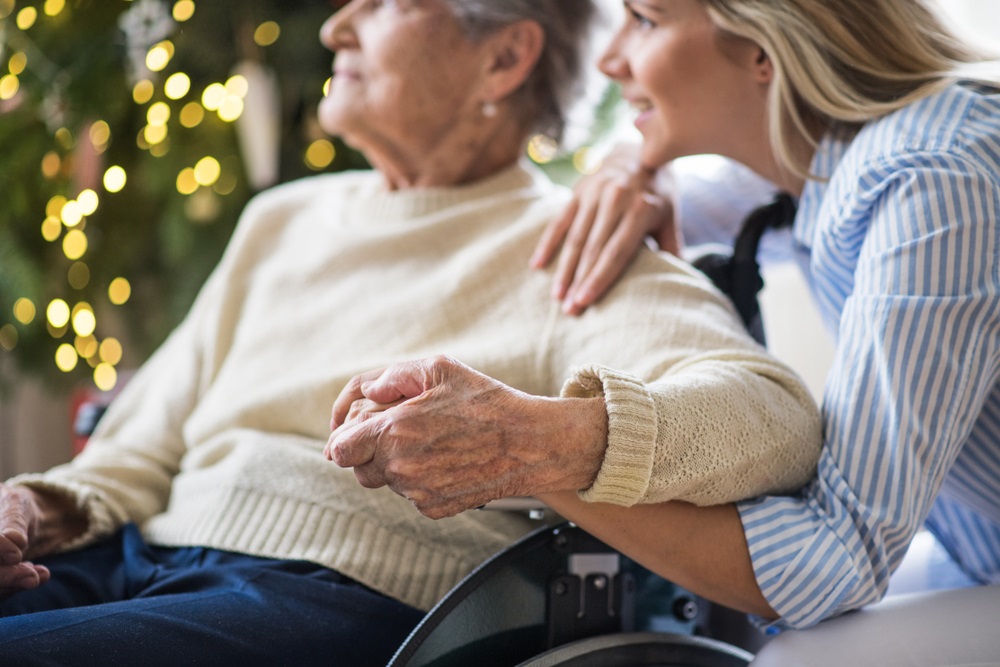There are so many reasons you can find yourself, or your loved one in the hospital. Many of which are events triggered by genetics, age, or other uncontrollable circumstances. Let’s take a look at a few common causes that you do have some control over.
Dehydration
Older adults are more susceptible to dehydration. There are many reasons for this, including lower fluid content in the body, decreased thirst response, and medications or underlying health conditions.
Recognizing the symptoms of dehydration is important so you can work to replace lost fluids. Look out for symptoms like dry mouth, fatigue, dark-colored urine, and lightheadedness.
Treating dehydration involves replacing lost fluids. You can work to prevent dehydration by making sure you regularly take in fluids throughout the day. This can include water, juices, broths, or foods with high water content.
If you’re unsure of your hydration needs for yourself or your loved one, talk to your doctor to find out how much water you should be drinking each day.
Source: https://www.healthline.com/health/symptoms-of-dehydration-in-elderly
Falls & Accidents
Each year, millions of older people, those 65 and older, fall. In fact, more than one out of four older people falls each year, but less than half tell their doctor. Falling once doubles your chances of falling again.
Here are the facts:
- One out of five falls causes a serious injury such as broken bones or a head injury
- Over 800,000 patients a year are hospitalized because of a fall injury, most often because of a head injury or hip fracture.
- Each year at least 300,000 older people are hospitalized for hip fractures.
Some of the major risk factors include:
- Home hazards or dangers such as
- broken or uneven steps, and
- throw rugs or clutter that can be tripped over.
- Lower body weakness
- Vitamin D deficiency (that is, not enough vitamin D in your system)
- Use of medicines, such as tranquilizers, sedatives, or antidepressants. Even some over-the-counter medicines can affect balance and how steady you are on your feet.
Falls can be prevented. These are some simple things you can do to keep yourself from falling.
- Talk to your doctor
- Ask your doctor or healthcare provider to evaluate your risk for falling and talk with them about specific things you can do.
- Ask your doctor or pharmacist to review your medicines to see if any might make you dizzy or sleepy. This should include prescription medicines and over-the counter medicines.
- Ask your doctor or healthcare provider about taking vitamin D supplements.
- Do Strength and Balance Exercises
- Do exercises that make your legs stronger and improve your balance. Tai Chi is a good example of this kind of exercise.
- Have Your Eyes Checked
- Have your eyes checked by an eye doctor at least once a year and be sure to update your eyeglasses if needed.
Source: https://www.cdc.gov/homeandrecreationalsafety/falls/adultfalls.html
Improper Diet
Eating a well-balanced diet is an important part of staying healthy as people age. It can help maintain a healthy weight, stay energized, and get the nutrients they need. It also lowers their risk of developing chronic health conditions, such as heart disease and diabetes.
According to the National Resource Center on Nutrition, Physical Activity, and Aging, 1 in 4 older Americans has poor nutrition. Malnutrition puts seniors at risk of becoming overweight or underweight. It can weaken their muscles and bones and can carry countless other health risks.
What you can do:
To meet your nutritional needs, eat foods that are rich in fiber, vitamins, minerals, and other nutrients. Limit foods that are high in processed sugars, saturated and trans fats, and salt. You may also have to adjust your diet to manage chronic health conditions. Your diet can have a profound effect on your overall health and cannot be underestimated.
Source: https://www.healthline.com/health/healthy-eating-for-seniors#healthy-diet
Medication Errors
A medication error is defined as “any preventable event that may cause or lead to inappropriate medication use or patient harm while the medication is in the control of the healthcare professional, patient, or consumer,” according to the National Coordinating Council for Medication Error Reporting and Prevention.
Every year, nearly 100,000 adults aged 65 and older are admitted to the hospital for drug side effects. In a recent study, the majority of problems were caused by “blood thinners” (warfarin and other oral anti-thrombosis drugs) and diabetes drugs (insulin and oral diabetes medicines).
Preventing and recognizing serious side effects are both important ways to keep senior citizens out of the hospital. Here are a few tips:
- Bring a list of all medicines to every doctor’s appointment. Include prescription medicine, non-prescription medicine, vitamins, and all supplements. Make sure that every doctor is aware of all your medicines. This can prevent overdoses if, for example, one doctor prescribes a brand-name drug and another doctor prescribes the same drug by its generic name.
- Carry a list of your drugs with you. That way, if you become ill away from home, doctors will know what medicines you take.
- When possible, fill all prescriptions at the same pharmacy. Tell the pharmacist about all other medicines you take – non-prescription, vitamins, and supplements. This will allow the pharmacist to check for drug interactions.
- Take your medicines exactly as the label recommends. Ask the pharmacist for help if you’re not sure what the instructions mean.
- Call your doctor if you have a question about how you feel.
Sources:
- https://www.fda.gov/drugs/drug-information-consumers/working-reduce-medication-errors
- https://www.poison.org/articles/2012-apr/hospitalization-of-seniors-from-medication
We understand that the job doesn’t get any easier when you’re having to be the caregiver for your loved one. We want you to know that you’re not alone, and we’d love to be a resource for you in every step of the process. Make sure to join our email list for more helpful tips and suggestions. You can reach us (here) if you have any immediate needs we can help with.

